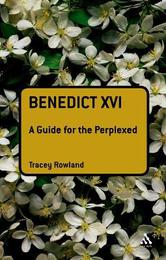
|
Benedict XVI: A Guide for the Perplexed
Paperback / softback
Main Details
| Title |
Benedict XVI: A Guide for the Perplexed
|
| Authors and Contributors |
By (author) Tracey Rowland
|
| Series | Guides for the Perplexed |
|---|
| Physical Properties |
| Format:Paperback / softback | | Pages:216 | | Dimensions(mm): Height 216,Width 138 |
|
| Category/Genre | Roman Catholicism and Roman Catholic churches
Christian theology |
|---|
| ISBN/Barcode |
9780567034373
|
| Classifications | Dewey:230.2092 |
|---|
| Audience | | Postgraduate, Research & Scholarly | |
|---|
|
Publishing Details |
| Publisher |
Bloomsbury Publishing PLC
|
| Imprint |
T.& T.Clark Ltd
|
| Publication Date |
13 May 2010 |
| Publication Country |
United Kingdom
|
Description
This is an upper-level introduction to the thought and theology of Pope Benedict XVI. The book explains the foundations of Ratzinger's thought by analysing the theological axes upon which his works turn and helps readers to place his thought in the context of his intellectual antecedents and contemporary interlocutors.
Author Biography
Tracey Rowland holds the St John Paul II Chair of Theology at the University of Notre Dame, Australia and is a member of the International Theological Commission.
Reviews'If to be famous is also to be misunderstood, then Joseph Ratzinger/Benedict XVI must count as one of the most misunderstood theologians of our time. No wonder even sympathetic readers find themselves perplexed and on the lookout for a reliable guide. In this latest in T&T Clark's Guide for the Perplexed series, Tracey Rowland has given us just what we need: the best overview of the pope's thought currently available.' - Edward T. Oakes, S.J., Chester & Margaret Paluch Professor of Theology, University of St. Mary of the Lake/ Mundelein Seminary, USA. -- Edward T. Oakes, S.J. 'Tracey Rowland's beautifully composed book is a masterpiece of scholarship and argument. With exceptional clarity, she shows that Pope Benedict's critique of secularism and his defense of traditional Catholicism are grounded in a symphonic synthesis - of Scripture, the living Tradition of the Church, the teachings of its Doctors and Fathers as well as a modern attention to history and culture. His Romantic Orthodoxy is key to a Christian Renaissance and the reunification of the episcopally-based Churches. As Rowland's vivid portrait reveals, Benedict's theological vision makes him one of the most significant pontiffs since the Reformation.' - Adrian Pabst, Lecturer in Politics, University of Kent at Canterbury, UK. -- Adrian Pabst
|